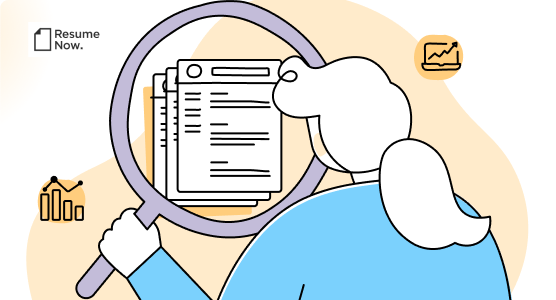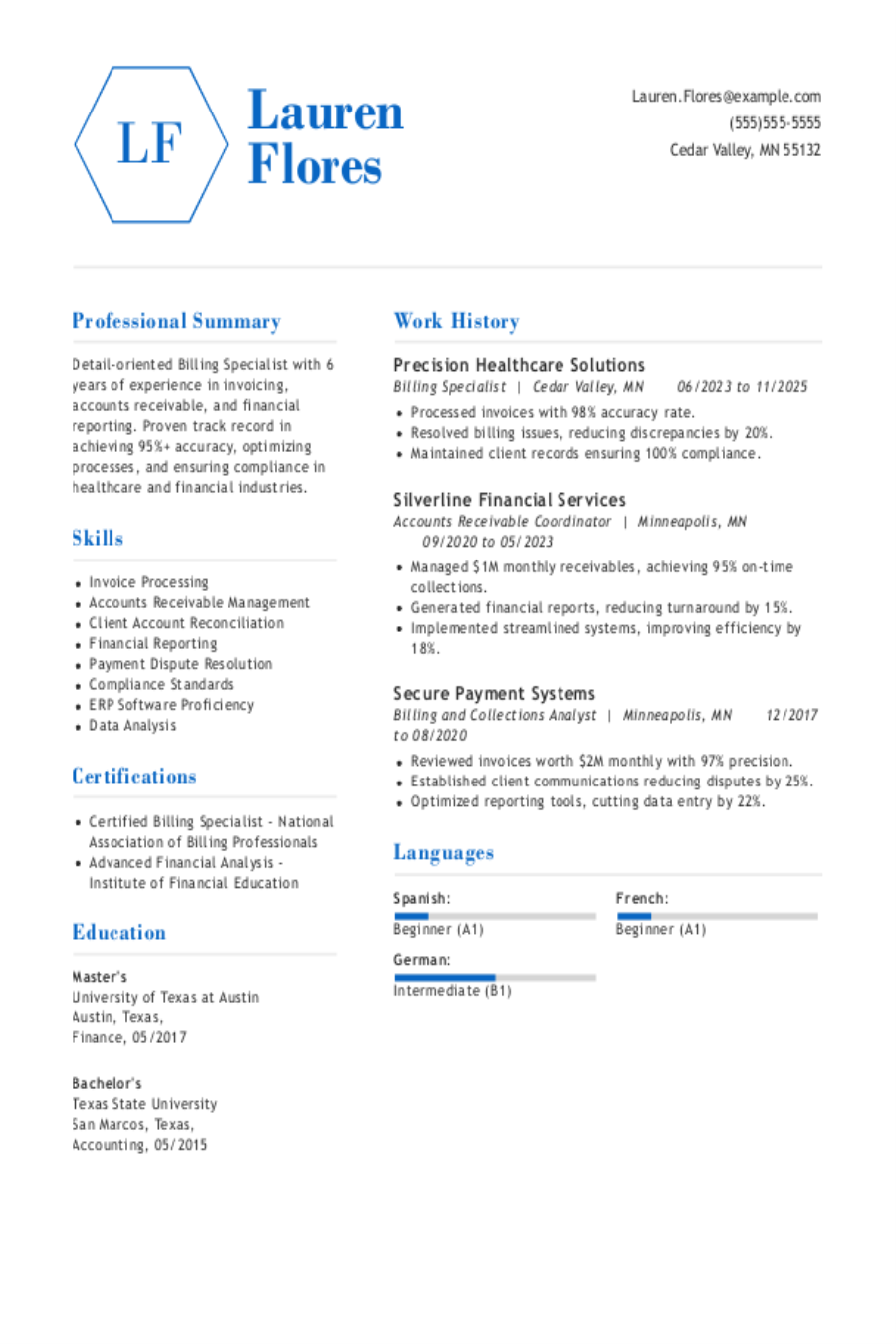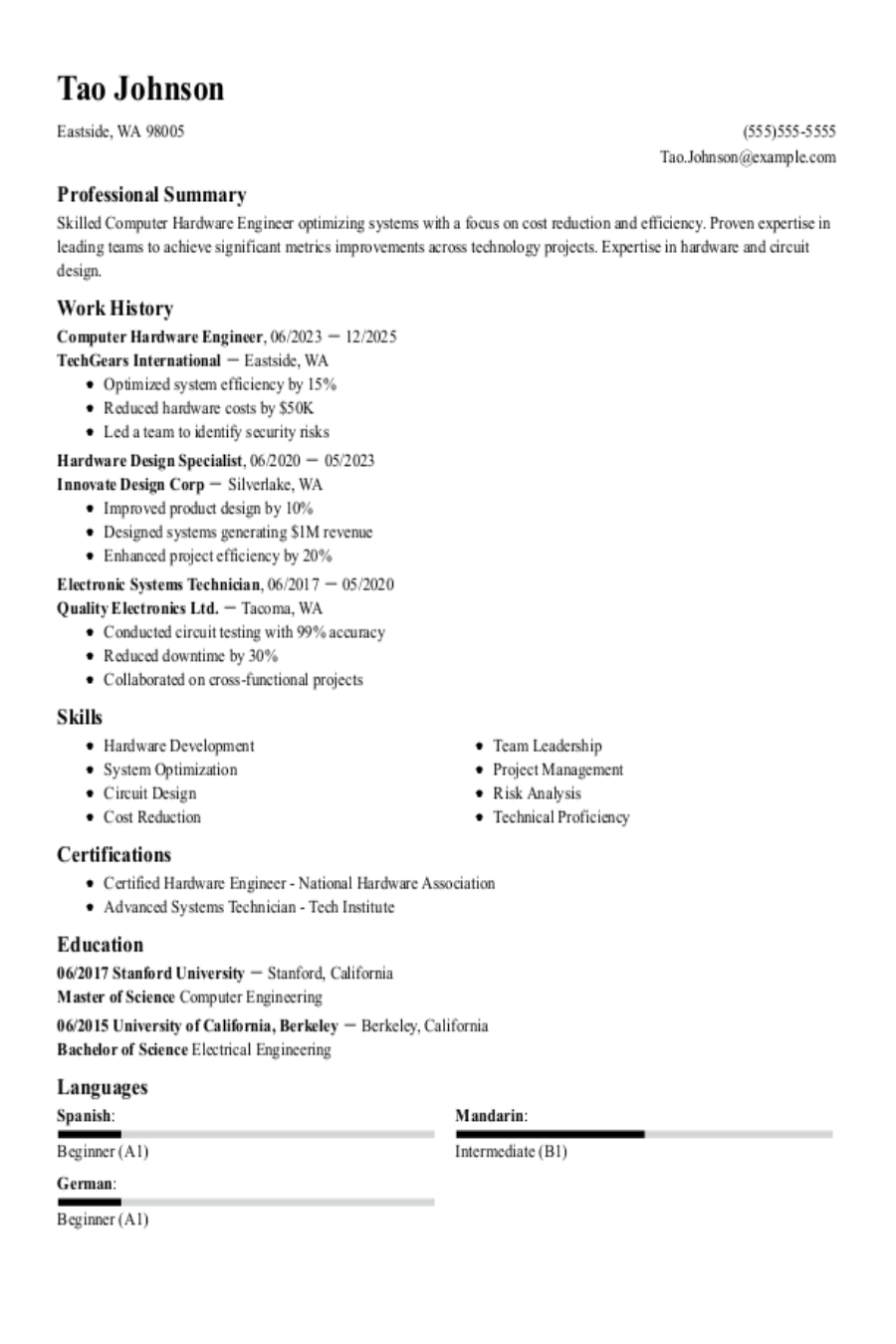Table of contents
Popular Clinical Research Coordinator Resume Examples
Entry-level clinical research coordinator resume
An entry-level resume for a clinical research coordinator should focus on relevant educational background, certifications, internships, and skills like data management, communication, and attention to detail to demonstrate capability.
Solid education: The resume effectively highlights advanced education relevant to clinical research coordination, showcasing a master's degree as well as a bachelor's degree in the required fields. These diplomas are evidence of a solid foundation in research methodology, regulatory compliance, and clinical trial management expertise.
Focus on goals: The applicant demonstrates a proactive approach to early career development as a clinical research coordinator, excelling in study management and regulatory compliance while pursuing certifications to improve expertise in the field.
Mid-career clinical research coordinator resume
A mid-career clinical research coordinator resume should emphasize extensive project experience, advanced analytical skills, and continuous professional growth to effectively demonstrate expertise in managing complex clinical trials.
Balance of experience and skills: This job seeker's resume effectively showcases a mix of technical skills in trial coordination and data management alongside an impressive trajectory of career advancement, highlighting significant achievements in participant retention and compliance.
Active language: Using action verbs such as "managed," "increased," and "streamlined" showcases initiative and measurable success, emphasizing the applicant's leadership in improving clinical trial efficiency and participant retention.
Experienced clinical research coordinator resume
An experienced clinical research coordinator resume should prioritize highlighting key achievements, relevant skills, and progressive responsibilities to clearly demonstrate the applicant's expertise and growth in the field of clinical research.
Reverse-chronological experience: This chronological resume format effectively highlights the job seeker's extensive experience in clinical research, allowing for a clear representation of their career growth and accomplishments through a structured timeline of roles and responsibilities.
Numerical data: Quantifiable achievements make a job seeker’s accomplishments tangible and recognizable to recruiters. By providing specific metrics, such as increasing participant recruitment by 25% or streamlining processes to reduce lead time by 20%, applicants can effectively demonstrate their impact in previous roles.
No experience clinical research coordinator resume
A resume for an applicant with no experience should emphasize relevant skills, education, and any volunteer or internship experiences that demonstrate the applicant's ability to contribute effectively to research projects.
Volunteer work: Integrating extracurricular activities and volunteer roles into a resume highlights relevant skills and commitment, improving the profile of applicants with limited professional experience in clinical research.
Emphasis on professional skills: Focusing on skills like communication and data management highlights the applicant's readiness for a clinical research coordinator work despite limited hands-on experience in the field.
More resume examples
Clinical Research Coordinator Resume Template
Looking to showcase your skills in clinical research? Start with this customizable resume template tailored for clinical research coordinators—simply personalize it with your details for a special touch.
Stephanie Butler
Portland, ME 04102
(555)555-5555
Stephanie.Butler@example.com
Professional Summary
Efficient Clinical Research Coordinator with 4+ years of experience in trial management, patient recruitment, and regulatory compliance. Proven ability to optimize processes, reduce errors by 20%, and streamline workflows to enhance clinical trial outcomes. Proficient in GCP, protocol development, and data analysis.
Work History
Clinical Research Coordinator
HealthCore Research Institute - Portland, ME
August 2024 - August 2025
- Managed 35+ clinical trial participants.
- Ensured 98% regulatory compliance in trials.
- Created detailed reports reducing errors by 15%.
Medical Research Assistant
Innovative MedTech Solutions - Portland, ME
August 2022 - July 2024
- Assisted in 12 studies improving study efficiency by 25%.
- Analyzed lab data, increasing accuracy by 30%.
- Streamlined processes, saving K annually.
Clinical Trial Assistant
Precision BioResearch Group - Portland, ME
August 2021 - July 2022
- Tracked 40+ subjects with a 95% retention rate.
- Optimized schedules, reducing delays by 20%.
- Generated weekly reports increasing insights accuracy.
Skills
- Clinical trial management
- Regulatory compliance expertise
- Patient recruitment strategy
- Data analysis and interpretation
- GCP (Good Clinical Practice)
- Protocol development
- Report writing and documentation
- Budget management
Education
Master of Science Clinical Research Management
Harvard University Cambridge, Massachusetts
July 2021
Bachelor of Science Biology
University of California, Berkeley Berkeley, California
July 2019
Certifications
- Certified Clinical Research Coordinator (CCRC) - Association of Clinical Research Professionals
- Certificate in GCP and Regulatory Affairs - National Institutes of Health
- Advanced Clinical Trial Design Certificate - American Research Academy
Languages
- Spanish - Beginner (A1)
- French - Intermediate (B1)
- Mandarin - Beginner (A1)
Must-Have Skills on a Clinical Research Coordinator Resume
A solid skills section is important for standing out in a competitive job market.
Healthcare and medical professionals make a direct impact on individual and community well-being. The skills you highlight should reflect your ability to deliver dependable support and uphold high standards. Your resume is a chance to show how you contribute meaningfully to quality care and positive outcom
The following data highlights the essential hard and soft skills relevant to a clinical research coordinator based on Resume Now’s internal resume data.
When you’re ready to improve your resume, make sure to try our AI Resume Skills Generator. It provides tailored suggestions for both hard and soft skills based on your specific job title, allowing you to create a comprehensive and unique skill set.
Writing Your Clinical Research Coordinator Resume
Having explored these effective resume examples, you’re now prepared to learn how to write a resume. We’ll guide you through each section step by step, giving you pro tips all along the way.
List your most relevant skills
A powerful skills section should focus on both technical abilities like data management and regulatory compliance, as well as essential soft skills such as teamwork and attention to detail. This mix will demonstrate your readiness to excel in the role.
To maximize your chances of getting noticed, always incorporate keywords from the job listing into your skills section. This not only helps human recruiters recognize you as a strong applicant but also assists applicant tracking systems (ATS) in identifying you as a match for the position. Be strategic—aligning your skills with those highlighted in the job description can significantly improve your application’s visibility and effectiveness.
Example of skills on a clinical research coordinator resume
- Proficient in managing clinical trials while ensuring compliance with regulatory standards
- Strong interpersonal skills to effectively communicate with study participants and team members
- Adept at data management and analysis to support research findings
- Organized multitasker with a keen eye for detail in documentation and reporting
A strong skills section showcases both hard and soft skills, demonstrating an applicant's ability to tackle technical tasks while effectively collaborating with team members. For example, skill in data analysis paired with excellent communication ensures success in clinical research environments.
Highlight your work history
Your work experience section is a key part of your clinical research coordinator resume. It’s an opportunity to emphasize the impact and achievements in each role. Focus on showcasing contributions that highlight how effectively you applied your skills, using action verbs and specific metrics to grab the attention of hiring managers.
For every job entry, include essential details like your title, employer name, and employment dates. These elements establish professional credibility and help employers quickly assess your background. Make sure each entry reflects both your responsibilities and standout accomplishments that distinguish you from other job seekers.
Example of a clinical research coordinator work experience entry
- Clinical Research Coordinator
Health Innovations Inc. - San Diego, CA
January 2021 - Present - Oversee the management of multiple clinical trials, ensuring compliance with regulatory requirements and protocols, achieving a 100% audit success rate
- Coordinate recruitment efforts for study participants, successfully enrolling over 150 subjects ahead of schedule through strategic outreach and engagement initiatives
- Facilitate communication between investigators, sponsors, and participants to streamline trial operations, improving workflow efficiency by 30%
- Train and mentor new staff on clinical trial procedures and data collection methods, improving team performance and reducing onboarding time by 25%
- Analyze trial data using statistical software to prepare detailed reports for stakeholders, contributing to informed decision-making and publication in peer-reviewed journals
When crafting resume bullet points, aim for concise statements that highlight your key achievements. Use action verbs and quantify results where possible, ensuring each point is powerful without unnecessary detail—a good rule of thumb is to keep it under two lines.
Include your education
The education section of your clinical research coordinator resume should be organized in reverse-chronological order, starting with your most recent academic achievements. Include degrees, diplomas, and any relevant certifications while omitting high school diplomas if you possess a bachelor’s degree or higher. Mention honors or special distinctions to add value to this section and showcase your academic excellence.
If you are currently enrolled in a program or have incomplete education, list your highest completed degree and include an expected graduation date. Highlight relevant coursework or significant projects through bullet points to provide insight into your specialized knowledge. This approach is particularly useful for applicants who are recent graduates or still pursuing their degrees as it emphasizes their educational background in the field.
Common certifications for a clinical research coordinator resume
- Certified Clinical Research Coordinator (CCRC) – Association of Clinical Research Professionals (ACRP)
- Clinical Research Associate (CRA) – Society of Clinical Research Associates (SoCRA)
- Certified Clinical Research Associate (CCRA) – Association of Clinical Research Professionals (ACRP)
- Good Clinical Practice (GCP) Certification – TransCelerate BioPharma Inc.
Showcase publications and research
As a clinical research coordinator, showcasing your publications is essential for demonstrating your specialized knowledge and commitment to advancing clinical studies. Publications serve as tangible evidence of your expertise in study design, methodology, and outcomes analysis, reinforcing your credibility within the medical and research community.
When deciding whether to create a dedicated publications section on your resume, consider the number of publications you have. If you possess several relevant pieces of work, this section is warranted. However, for only one or two publications, integrating them into sections like education or experience may be more effective. Ensure that they are cited correctly in accordance with the appropriate style guide commonly accepted in your field.
Example of a publications section
- Taylor, J., & Smith, L. (2024). "Innovations in Clinical Trial Design". Clinical Research Journal, 18(1), 45-60.
- Johnson, A. & Lee, R. (2023). "Patient Recruitment Strategies: A Systematic Review". Journal of Clinical Trials, 10(4), 213-230.
- Project Coordinator, National Health Initiative (2022–2023). "Clinical Trial Monitoring Contribution". Oversaw data collection for five multi-site clinical trials.
- Chen, H., Johnson, A., et al. (2022). "Collaborative Approaches to Data Management in Trials". International Journal of Research Methods, 29(3), 145-160.
Sum up your resume with an introduction
The opening profile of your resume functions as your personal elevator pitch, designed to immediately convey your professional strengths and potential contributions. A thoughtfully crafted profile can significantly increase your chances of securing an interview by making a positive first impression.
When developing this section, consider whether a professional summary or resume objective better serves your needs. Professional summaries work exceptionally well for candidates with established careers, enabling them to showcase quantifiable achievements and proven performance. Resume objectives are particularly valuable for recent graduates or professionals transitioning between industries, providing a platform to emphasize relevant academic preparation and clear professional objectives.
Professional summary example
Dynamic clinical research coordinator with over 5 years of experience in managing complex clinical trials within diverse therapeutic areas. Demonstrated success in improving study protocols, ensuring compliance with regulatory standards, and fostering collaborative relationships with cross-functional teams. Proficient in data management, patient recruitment strategies, and monitoring trial progress to achieve timely and accurate results.
Resume objective example
Enthusiastic clinical research coordinator eager to use strong analytical and communication skills to support innovative research projects. Committed to ensuring compliance and improving participant engagement, aiming to contribute to groundbreaking studies that advance healthcare outcomes.
Always kick off your resume profile with your job title. This approach allows you to clearly convey your professional identity right from the start, ensuring that potential employers instantly recognize who you are and what expertise you bring to the table.
Add unique sections to set you apart
Optional resume sections can significantly improve your profile as a clinical research coordinator by highlighting your unique qualifications. These segments allow you to showcase skills and experiences that set you apart from other applicants.
Including details about relevant hobbies or volunteer work not only reflects your personal values but also demonstrates key competencies related to the role. For instance, if you've volunteered in health-related initiatives, it shows your commitment to the field. Additionally, showcasing skills acquired through these activities can provide potential employers with insight into your working style and how you might contribute positively to their team.
Three sections perfect for a clinical research coordinator resume
- Clinical trial management: Include examples of trials you've coordinated, your role in the planning and execution phases, and any outcomes that highlight your impact on the research process.
- Regulatory compliance: Detail your experience with maintaining compliance, including specific regulations you've navigated and how you ensured adherence throughout various studies.
- Data analysis skills: Discuss any statistical tools or software you're proficient in, as well as specific analyses you've conducted that contributed to successful project outcomes.
5 Resume Formatting Tips
- Choose a format that matches your career stage.
When selecting a resume format, consider your career level and experience. If you have an extensive background in clinical research, a chronological format effectively showcases your growth. For those newer to the field, a functional resume can highlight relevant skills and education without emphasizing gaps in work history. Alternatively, a combination format might be ideal for prominently presenting both your experience and competencies.
- Pick a smart resume template.
Using a professional resume template is important for improving readability and ensuring your information stands out. A well-structured template helps you organize your achievements and skills clearly, making it easier for hiring managers to quickly grasp your qualifications. If you prefer a custom design, aim for simplicity and select fonts that are ATS-friendly to maximize compatibility with applicant tracking systems.
- Use an appropriate font.
Opt for a clean and professional font like Arial, Calibri, or Helvetica to improve readability. Avoid overly stylized fonts as they can distract from your qualifications and may not be compatible with applicant tracking systems (ATS).
- Use consistent formatting.
Ensure your resume is neatly aligned to the left with uniform margins, creating a polished and professional look that stands out to hiring managers.
- Keep your resume to one or two pages.
Remember that resumes should be one page long unless you have extensive experience. Focus on keeping your content concise and relevant to highlight your qualifications effectively without overwhelming the reader.
Tools for Your Job Search
Are you preparing to apply for that exciting clinical research coordinator role? Before you hit submit, take advantage of our ATS Resume Checker. This essential tool provides insights into how well your resume aligns with the automated screening systems many clinical research organizations use to filter job seekers.
Need more assistance refining your resume? Our AI Resume Builder offers tailored recommendations specifically designed for the clinical research field, along with professional templates that will help showcase your unique qualifications and experiences effectively.
Frequently Asked Questions
Last Updated: August 22, 2025
Absolutely. A cover letter improves your resume by providing essential context and creating opportunities for communication with employers. It’s the perfect platform for you to express what draws you to the clinical research coordinator role and how your unique experiences make you an ideal applicant. Don’t overlook this critical step—write a cover letter that highlights your passion and qualifications.
For added convenience, consider using our AI Cover Letter Generator, which allows you to create a tailored, job-winning cover letter in just minutes. You can choose from various cover letter template options that align perfectly with your resume, ensuring a polished and professional presentation of your candidacy.
A resume is usually a concise document, spanning one to two pages, highlighting your most relevant work experience and skills. In contrast, a CV (curriculum vitae) can extend several pages and offers a comprehensive overview of your academic background, research contributions, publications, and detailed professional experiences.
You should use a CV when applying for roles in academia or specialized fields such as law or medicine. If you’re unsure whether to use a CV or resume for your application, our online CV Maker is an excellent resource. It allows you to create tailored CVs quickly and efficiently by selecting from various CV templates designed for different industries and career levels.
Choosing the right resume format is important and should align with your career level and strengths. Inexperienced applicants may find the functional format most effective, highlighting relevant skills over work history. Conversely, experienced professionals benefit from a chronological format, which showcases their extensive experience. For those at a mid-level, a combination format serves well by balancing both skills and experience, presenting a well-rounded view to potential employers.
Select a polished, professional template and integrate relevant keywords from the job description. This strategy showcases your qualifications and aligns you with the employer's needs effectively.
To improve your networking skills, prioritize connecting regularly with former colleagues. Join professional organizations related to clinical research for valuable resources and networking opportunities. Additionally, keep your LinkedIn profile updated to showcase your expertise and stay engaged with industry trends and professionals.
You can showcase your commitment to professional growth by acquiring relevant certifications and listing them on your resume. Additionally, highlight completed courses, seminars attended, and insightful books or podcasts that keep you informed about industry trends. Membership in professional associations also demonstrates your commitment to staying engaged and knowledgeable within the field.
Was this information helpful? Let us know!
Hailey is a career advice writer dedicated to helping job seekers excel in their careers.
More resources

Only 1 in 10 Resumes Include Measurable Results, New Analysis of 18.4M U.S. Resumes Finds
Resume Now takes a closer look at measurable results on resume...

Top Entry‑Level Careers That Are Fast‑Growing, Higher‑Paying, and AI‑Resistant
Artificial intelligence is touching more parts of work every y...

What Does It Mean if an Interviewer Says "Good Luck" or "We'll Be In Touch"?
Read on to learn the meaning behind these standard post-interv...

Billing Resume: Examples & Templates
As a billing professional you need a resume that captures the...

Interview-Winning Computer Software Resumes Examples and Tips
As a computer software professional your resume should showca...

Computer Hardware Resume: Examples & Templates
As a computer hardware professional you need a resume that sh...

